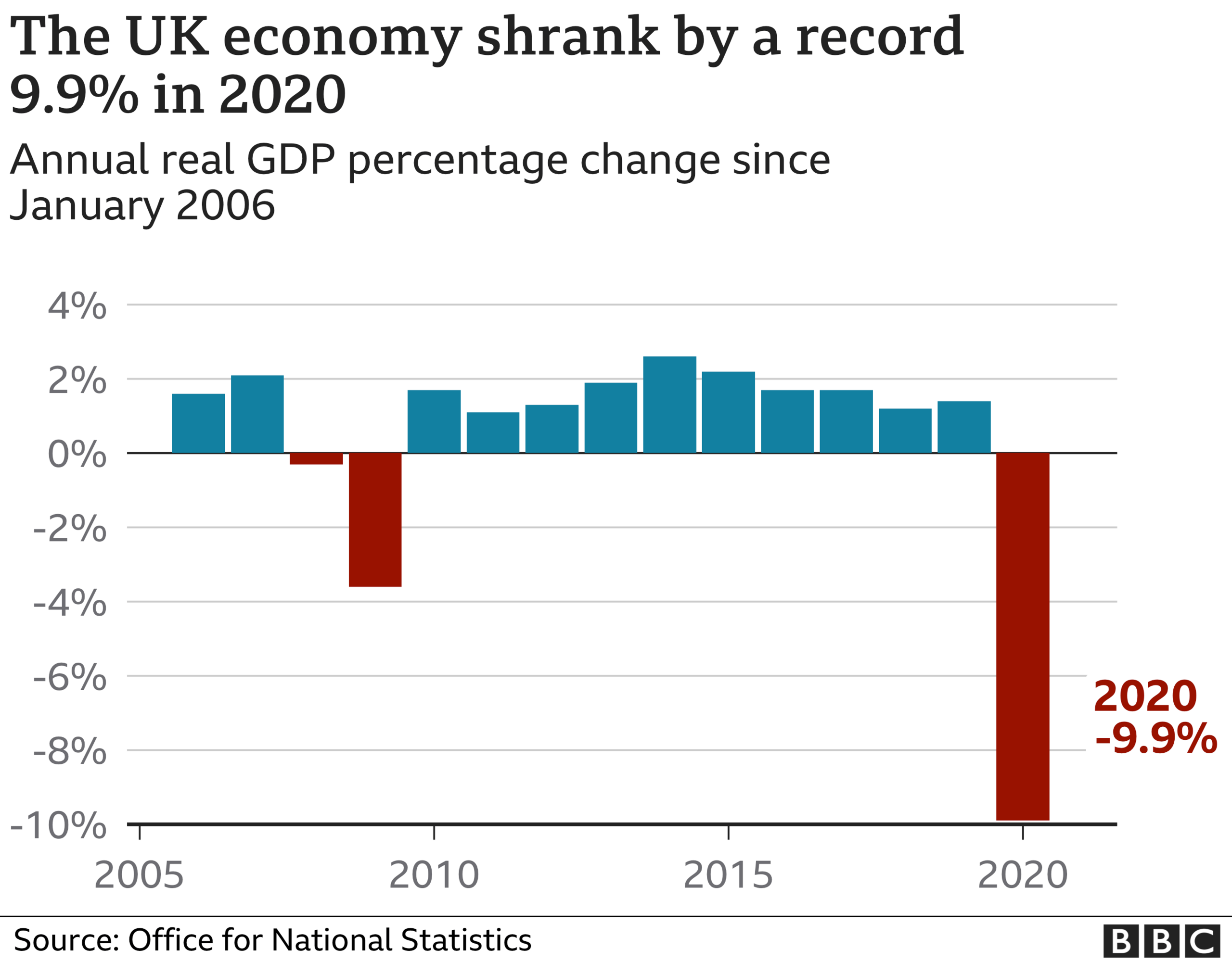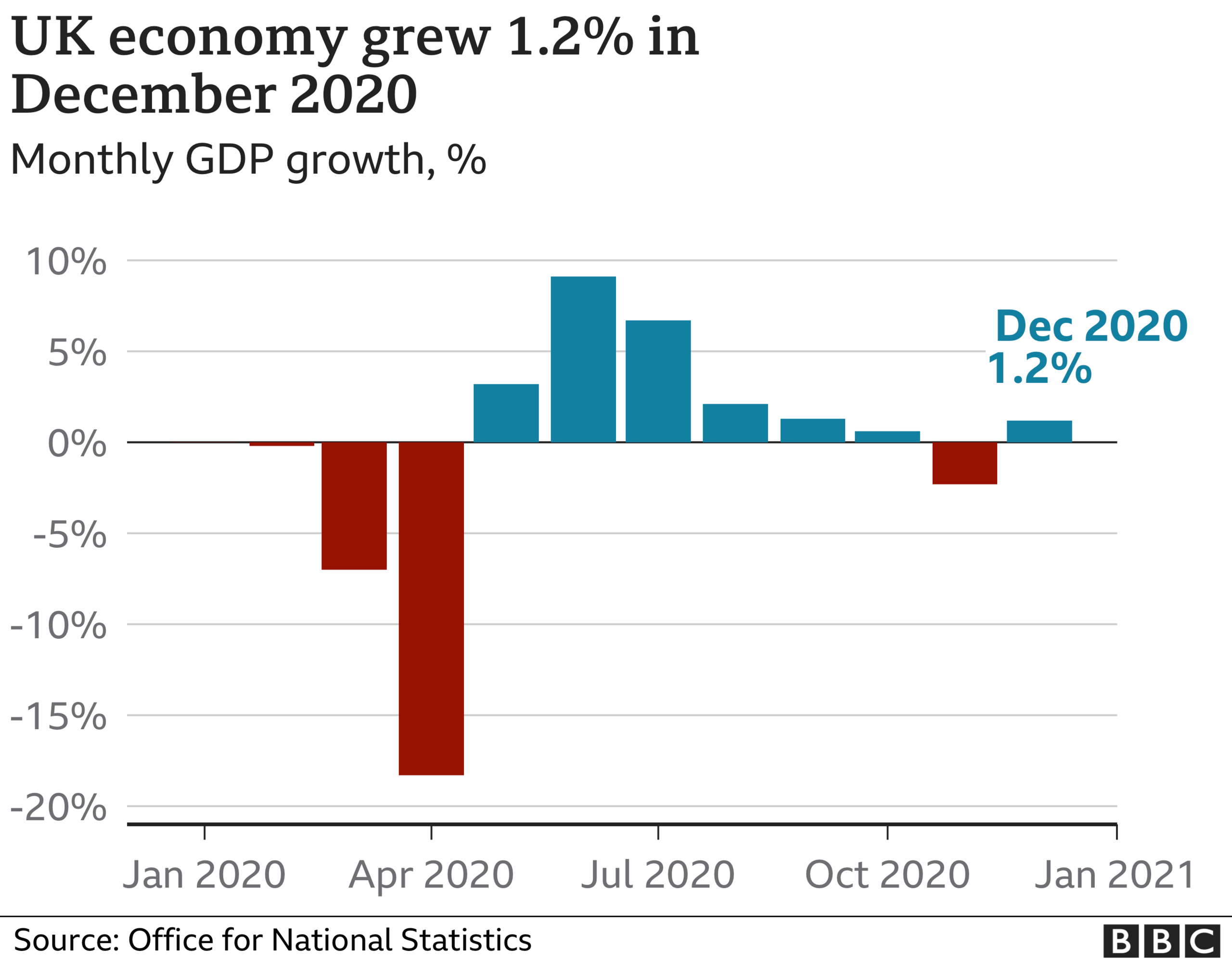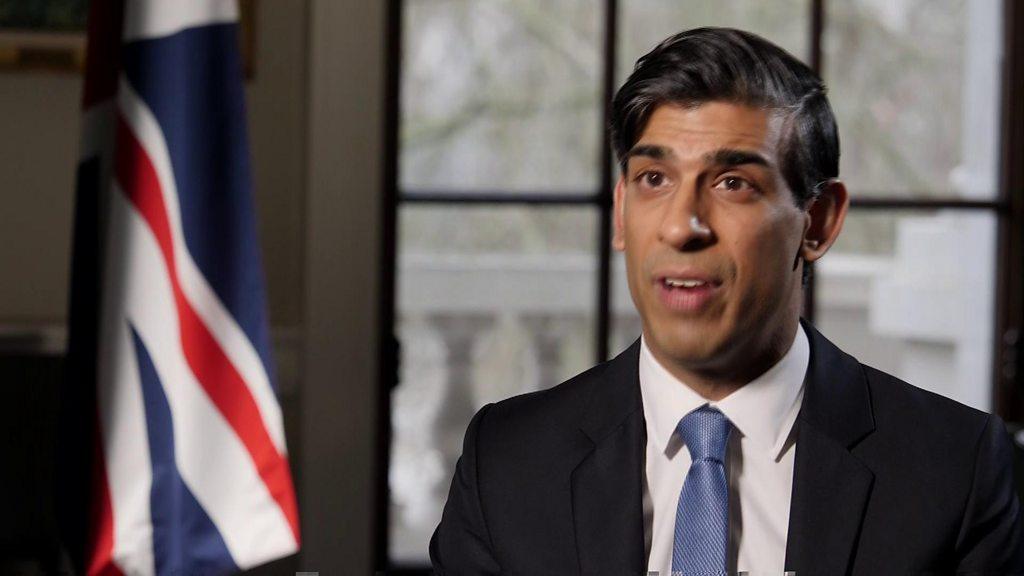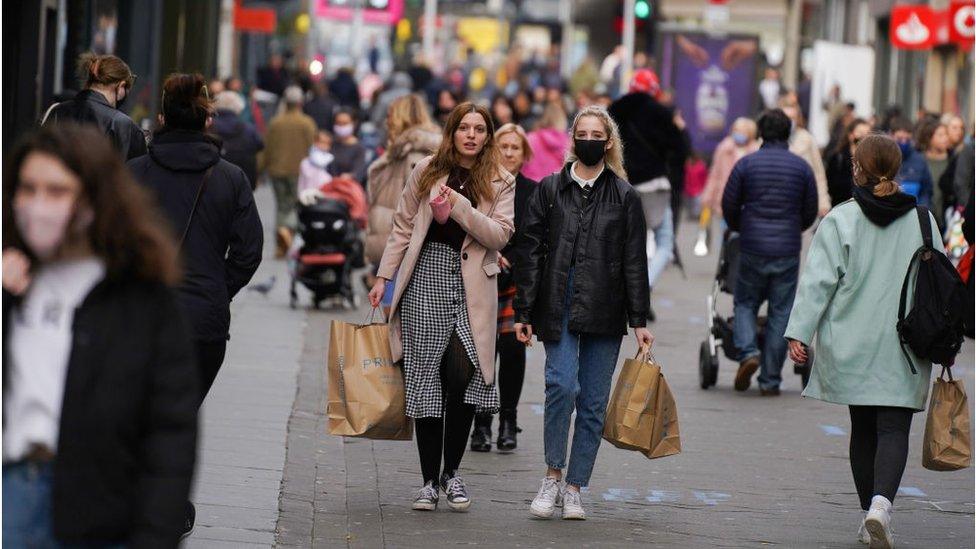UK economy suffered record annual slump in 2020
- Published
- comments

The ONS said hairdressing was one sector that recovered lost ground in December
The UK economy shrank by a record 9.9% last year as coronavirus restrictions hit output, official figures show.
The contraction in 2020 "was more than twice as much as the previous largest annual fall on record", the Office for National Statistics (ONS) said.
However, the economy looks set to avoid a double-dip recession after growth picked up at the end of the year.
In December, the economy grew by 1.2%, after shrinking by 2.3% in November, as some restrictions eased.
Hospitality, car sales and hairdressers recovered some lost ground, the ONS said.
Cancellor Rishi Sunak says the GDP slump is "comparable to other countries"
The growth meant that in the October-to-December quarter the economy expanded by 1%. As a result, the UK is expected to avoid what could have been its first double-dip recession since the 1970s.
A double-dip is when the economy briefly recovers from recession, only to quickly sink back. A recession is generally defined as two consecutive quarters where the economy contracts.
ONS deputy national statistician Jonathan Athow said: "An increase in Covid-19 testing and tracing also boosted output. The economy continued to grow in the fourth quarter as a whole, despite the additional [lockdown] restrictions in November."
GDP was first measured in the aftermath of the Second World War, and the measure has never previously dropped by more than 4.1% in a year. However, the Bank of England models GDP going back centuries, and the 2020 contraction could be the worse since 1709.

Suren Thiru, the head of economics at the British Chambers of Commerce, said: "Despite avoiding a double-dip recession, with output still well below pre-pandemic levels amid confirmation that 2020 was a historically bleak year for the UK economy, there is little to cheer in the latest data."
All four economic sectors tracked by the ONS saw a drop in output, with the highest fall coming in the construction sector, which contracted by 12.5%.
Chancellor Rishi Sunak told the BBC: "Today's figures show that last year our economy experienced a significant shock, and also some signs of resilience over winter.
"You know what's clear is right now, many families and businesses are experiencing hardship. That's why we've put in place a comprehensive plan for jobs to support people through this crisis, and we will set out the next stage of our economic response at our Budget in early March."
But shadow chancellor Anneliese Dodds said: "These figures confirm that not only has the UK had the worst death toll in Europe, we're experiencing the worst economic crisis of any major economy.
"Businesses can't wait any longer. The chancellor needs to come forward now with a plan to secure the economy in the months ahead, with support going hand-in-hand with health restrictions."
However, Mr Sunak said international economic comparisons were not necessarily a useful yardstick.
"We calculate GDP in a different way to pretty much everybody else. And if you either correct for that difference or look at it in a way that's more comfortable with nominal GDP, what you find, as the Bank of England and the ONS have pointed out, is that our performance is very much in line and comparable to other countries."

Economists said that with Covid-19 restrictions expected to remain until early spring, the hit to the economy will continue over the next few months.
"We anticipate a sharp decline in activity during the first quarter of the year," said Kemar Whyte, senior economist at the National Institute of Economic and Social Research. "Nevertheless, growth will pick up from the second quarter onwards as restrictions ease on the back of a successful vaccination programme."


As expected the economy stabilised in the last quarter of 2020. But the latest set of statistics confirm the scale of the hit over the whole of last year.
A technical return to recession has been avoided, with the economy returning to growth at the end of last year. But the economy is certainly falling again so far in the first three months of 2021, due to the tough national lockdowns, as well as some impact from increased trade barriers with the European Union.
The chancellor and Bank of England will be paying much more attention to what is going on right now. The renewed lockdown has hit growth considerably again, but not as hard as last April.
Businesses and households remain in holding pattern ready to unleash pent up growth when the economy is reopened.
While the vaccine will eventually unlock that growth, the precise timing is still uncertain, and the government remains under pressure to maintain significant sums in economic support.

'Coiled spring'
Last year's contraction is steeper than almost any other big economy, although Spain suffered an 11% decline.
Britain has reported Europe's highest death toll from coronavirus and is among the world's highest in terms of deaths per head of population.
Much of the damage to the UK economy is attributed by economists to a high dependence on the service sector, which suffered particularly badly during the year because of lockdown.
However, Britain has vaccinated many more people than other European countries so far, raising the prospect of a bounce-back for its economy later this year.
That potential fast rebound prompted the Bank of England's chief economist to describe the economy as like a "coiled spring" ready to release large amounts of "pent-up financial energy".
Andy Haldane said on Thursday that consumer confidence would surge back thanks to the vaccine programme, with the economy firing "on all cylinders" by spring.
Mr Sunak told the BBC: "There are reasons for cautious optimism, because the vaccine roll-out is going really well.
"The prime minister will set out a roadmap for exiting restrictions in the next few weeks and months. It will be the week of February, 22nd, and it's related that we base our roadmap on the best possible evidence of data."
- Published12 February 2021

- Published12 February 2021
- Published12 February 2021

- Published12 February 2021

